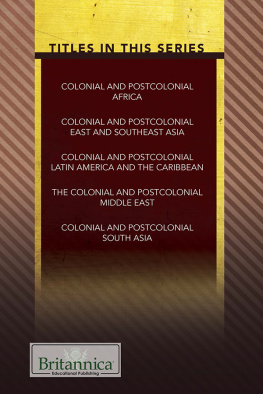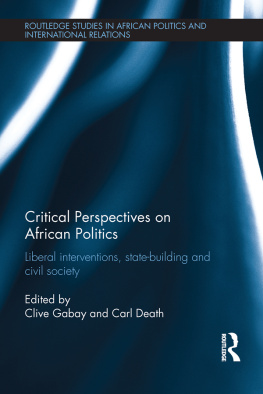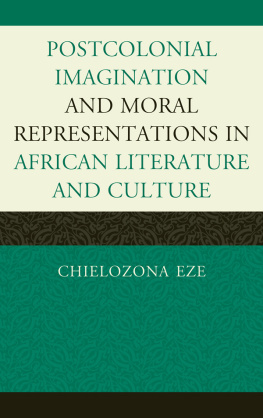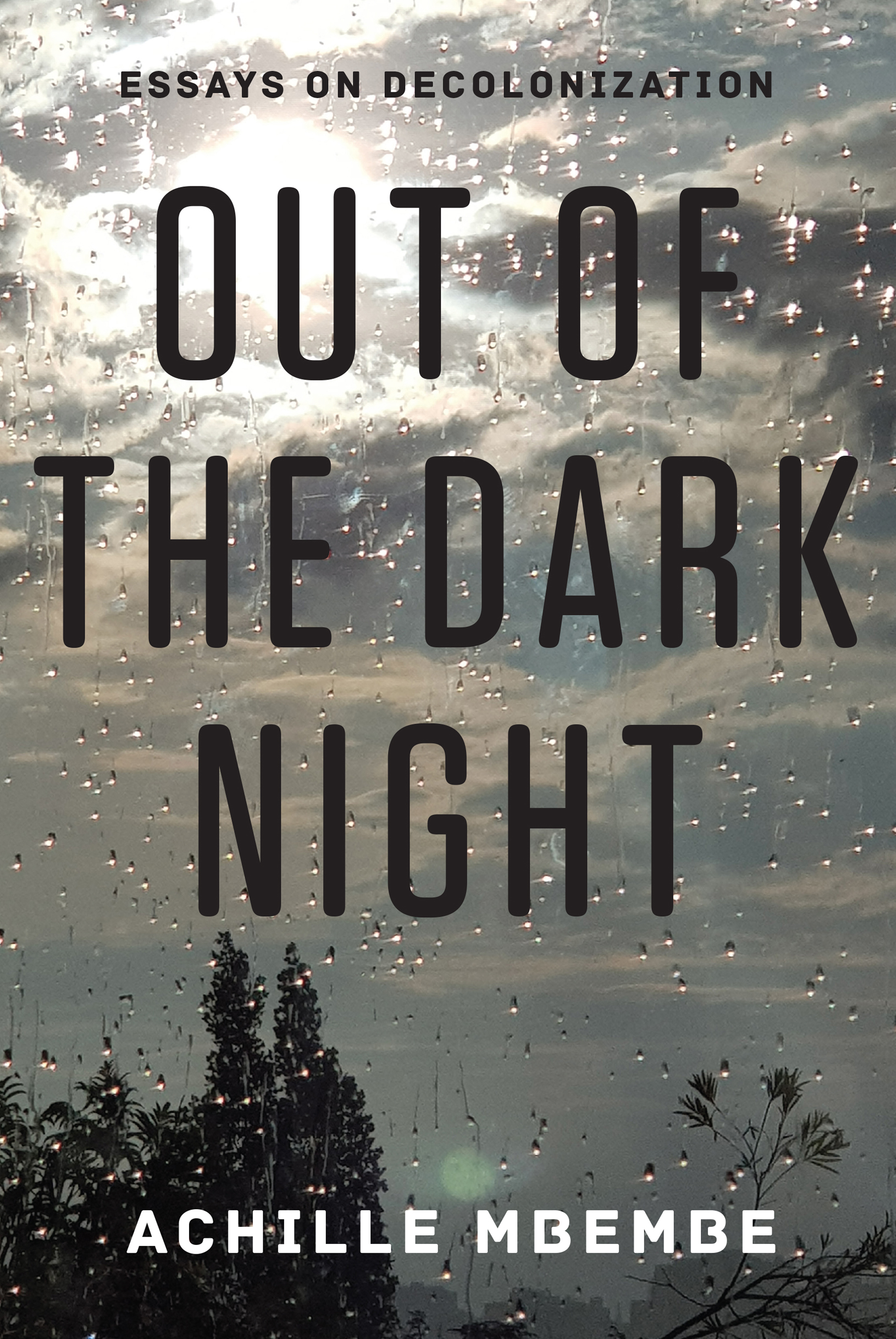Names: Mbembe, Achille, 1957 author. | Mbembe, Achille, 1957 Sortir de la grande nuit. English.
Title: Out of the dark night : essays on decolonization / Achille Mbembe.
Description: New York : Columbia University Press, 2021. | The English edition of this book does not exactly correspond to what was published in French as Sortir de la grande nuit in 2010, and different passages date from different times of writing and have different translators. Daniela Ginsburg translated the material that came from Sortir de la grande nuit. Portions of the new material is based on work featured in my essay Future Knowledges and Their Implications for the Decolonizing Project, in Decolonisation in Universities: The Politics of Knowledge, edited by Jonathan Jansen and published by Wits University Press in 2019page viii. | Includes bibliographical references.
Identifiers: LCCN 2020045271 (print) | LCCN 2020045272 (ebook) | ISBN 9780231160285 (hardback)
Subjects: LCSH: PostcolonialismAfrica. | AfricaPolitics and government1960 | AfricaSocial conditions1960
Classification: LCC JQ1875 .M42313 2021 (print) | LCC JQ1875 (ebook) | DDC 325.3096dc23
A Columbia University Press E-book.
CUP would be pleased to hear about your reading experience with this e-book at .
T his book is the fruit of long conversations with Franoise Vergs. It repeats, sometimes verbatim, reflections, developed over the course of the past ten years between Africa, France, and the United States, in the form of journal articles (Le Dbat, Esprit, Cahiers dtudes africaine, Le Monde diplomatique), course notes, seminars, workshops, and interventions in the African press and other international media. I would like to express my gratitude to those who have provoked, encouraged, nourished, and welcomed these reflections: Pierre Nora, Olivier Mongin, Jean-Louis Schlegel, Michel Agier, Didier Fassin, Georges Nivat, Pascal Blanchard, Nicolas Bancel, Annalisa Oboe, Bogumil Jewsiewicki, Thomas Blom Hansen, Arjun Appadurai, Dilip Gaonkar, Jean Comaroff, John Comaroff, Peter Geschiere, David Theo Goldberg, Laurent Dubois, Clestin Monga, Yara El-Ghadban, Anne-Ccile Robert, Alain Mabanckou, and Ian Baucom.
This work was written during my long stay at the Wits Institute for Social and Economic Research (WiSER) in Johannesburg, where I benefited from the support of my colleagues Deborah Posel, John Hyslop, Pamila Gupta, Irma Duplessis, and Sarah Nuttall. I also benefited from discussions at the Johannesburg Workshop in Theory and Criticisim (JWTC), directed by Kelly Gillespie, Julia Hornberger, Leigh-Ann Naidoo, Eric Worby, Tawana Kupe, and Sue van Zyl. Franois Gze, Batrice Didiot, Pascales Iltis, and Johanna Bourgault, from ditions La Dcouverte, have marvelously accompanied the process of the books making and have not hesitated to share their intuitions.
The English edition of this book does not exactly correspond to what was published in French as Sortir de la grande nuit in 2010, and different passages date from different times of writing and have different translators. Daniela Ginsburg translated the material that came from Sortir de la grande nuit. Portions of the new material are based on work featured in my essay Future Knowledges and Their Implications for the Decolonising Project, in Decolonisation in Universities: The Politics of Knowledge, edited by Jonathan Jansen and published by Wits University Press in 2019.
Those who, each day, pitch camp farther off from their birthplace, those who, each day, haul in their boat on other banks, know better, day by day, the course of illegible things; and tracing the rivers towards their source, through the green world of appearances they are caught up suddenly into that harsh glare where all language loses its power.
Saint-John Perse, Snows
H alf a century ago, most of humanity was living under the yoke of colonialism, a particularly primitive form of racial despotism. Colonialism was itself but one dimension of a long history, that of imperialism, the ruthless drive for dominance which periodically seized metropolitan states, leading them to trample over the sovereignty of other political communities. Historians identify three waves of active imperialism in modern European history. The first, argues C. A. Bayly, was marked by the Iberian and Dutch conquests in the New World and Asia between 1520 and 1620. The second occurred between about 1760 and 1830 when European empires first seized substantial territory in south and south-east Asia, raced ahead in north America and Australasia, marked out the near east and southern Africa as spheres of dominance, and brought the Atlantic slave system to its peak. The third age of imperialism culminated with the Partition of Africa after 1878, the Russian conquest of central Asia and the battle for concessions in China.
The liberation of part of humanity from the yoke of colonialism constitutes a key moment in the history of our modernity. That this event left almost no mark on the philosophical spirit of our time is in itself hardly an enigma. Not all crimes necessarily engender sacred things. Certain crimes in history have resulted in nothing but stains and profanity, the splendid sterility of an atrophied existence: in short, they show the impossibility of making community and rewalking the paths of humanity. Can it be said that decolonization was precisely the spectacle par excellence of the impossible communityrife with spasmodic convulsion and futile static noise? This book will only indirectly tackle this question, the complete and detailed history of which remains to be written.
Its central object is the wave of African decolonizations during the twentieth century. I will not be retracing their history or studying their sociologyeven less their typology. Such work has already been done and, with few exceptions, there is very little to add to it. Colonization was perceived as neither a destiny nor a necessity as the decolonized community tried to establish itself on its ruins. It was thought that by dismembering the colonial relationship, the lost name would resurface. The relation between what had been, what had just happened, and what was coming would be reversed, making possible the manifestation of ones own power of genesis, ones own capacity for articulating difference and for expressing a positive force.
In addition to the will to community, there was the will to know and the desire for singularity and originality. Anticolonial discourse had, for the most part, espoused the postulate of modernization and the ideals of progress, including where it criticized them either explicitly or implicitly. This critique was animated by the quest for a future that would not be written in advance, one that would mix together received or inherited traditions with interpretation, experimentation, and new creation to leave this world and go toward other possible worlds. At the heart of this analysis was the idea that Western modernity was imperfect, incomplete, and unfinished. The Western claim to epitomize the language and forms in which any human event could arise, and even to have a monopoly on the very idea of the future, was only a fiction. The new postcolonial world was not condemned to imitate and reproduce what had been accomplished elsewhere.






